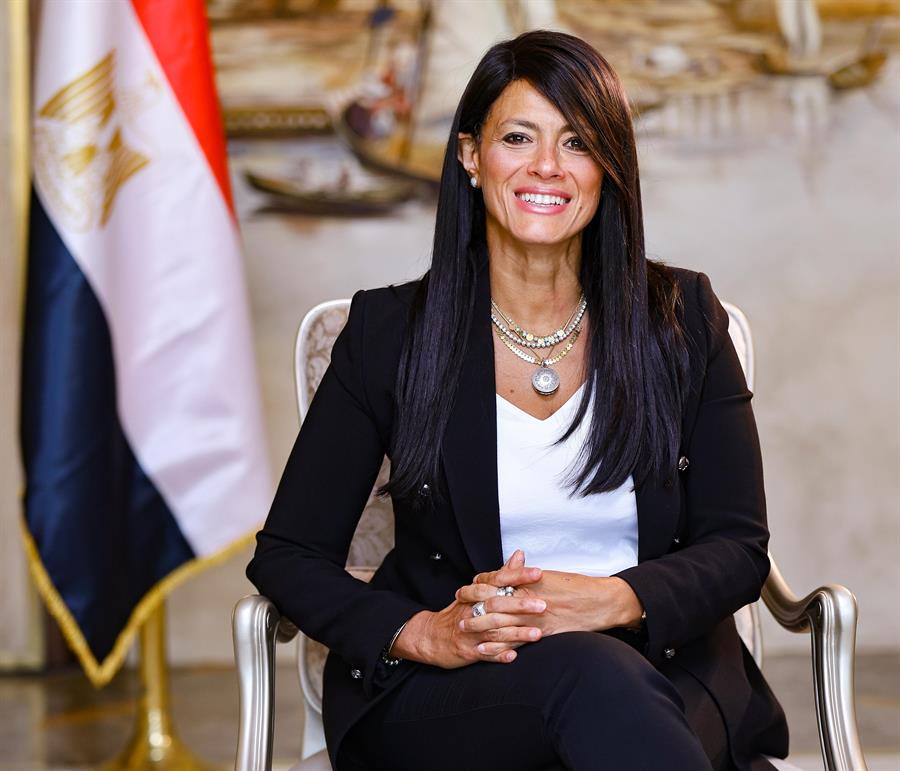Egypt’s Minister of Planning & Economic Development, Dr. Hala El-Said delivers five messages to the World during her participation at WYF…

14 January 2022
Egypt is keen on the participatory approach in its development experience and maximizes the role of civil society and the private sector.
International institutions should work to change the shape and priorities of the global economy after the pandemic through using innovative financing tools to reduce the burden on middle and developing countries.
The volume of achievement and work that has been achieved in Egypt over the past seven years is unprecedented.
It is fair to evaluate the development experience of Egypt within the framework of the components of the regional and international scene.
Egypt was the only country during the crisis; that launched a structural economic reform program.
H.E. Dr. Hala El-Said, Egypt’s Minister of Planning & Economic Development participated recently in a session entitled "Development Partners", which was held on the sidelines of the activities of the fourth edition of the World Youth Forum (WYF) in Sharm El-Sheikh.
The conference was held under the patronage and attendance of President Abdel Fattah El-Sisi, with the participation of a large international presence from many heads of state, officials, and thousands of young people from all continents of the world.
During her speech, Dr. Hala El-Said emphasized that the Egyptian state is adopting the participatory approach in all development plans and programs.
El-Said pointed out that Egypt enjoys close cooperation relations with all development partners.
She further noted that Egypt is keen on permanent cooperation with all international institutions, in addition to being an active member of most regional and international organizations since its inception.
El-Said added that Egypt also has a growing portfolio with development partners worldwide in various sectors such as housing, environment, transportation, small projects, education, energy, health, and enhancing the role of the private sector, which comes within the framework of achieving the goals of Egypt's Vision 2030.
During the session, the Minister of Planning and Economic Development addressed five basic messages:-
The first is that Egypt is always keen to share its development experience with all countries of the world and in cooperation with international organizations.
She pointed out that Egypt is among only 10 countries in the world that submitted a Voluntary National Report (VNR) to the United Nations to clarify progress in achieving the sustainable development goals, and this is the third time that Egypt has submitted this report.
El-Said pointed out that for the first time, the sustainable development goals have been localized at the governorate level.
She said that Egypt is keen to open up to the world and provides data that shows the state of development in the country, which was embodied in the launch of the Human Development Index 2021, in which the “Action Contract” was drawn up, making Egypt the only country that submitted the achievement contract.
The second message was that the volume of achievement and work being achieved in Egypt over the past seven years is unprecedented in terms of public spending that exceeded EGP six trillion, and in terms of the sectors in which development took place, the number of beneficiaries, and the return from this development experience.
El-Said stressed that Egypt is the only country in which development and service initiatives and national projects have not stopped despite the Corona crisis with its different strains.
She explained that it is at the forefront of these projects; The "Decent Life" project is the largest national project in the world in terms of the number of beneficiaries, more than 58 million citizens.
She continued that these development efforts were reflected in the success of the Egyptian economy, to be among the few economies in the world, which achieved positive growth rates of 3.3% in the past fiscal year, and this year we aim to achieve growth rates close to 6%.
El-Said pointed out that these growth rates are reflected in the provision of decent work opportunities, which is the ultimate goal that the state seeks, and consequently, a decrease in unemployment and inflation rates.
She also referred to the third message, which is about evaluating the Egyptian development experience, explaining that Egypt's development experience took place within the framework of a region witnessing many conflicts, in addition to the conditions of the pandemic, which leads to many challenges, so it is fair to evaluate the development experience of Egypt within the framework of the components of this regional and international landscape.
Dr. Hala El-Said stated that the fourth message is that Egypt was the only country during the crisis which launched a structural economic reform program to increase the competitiveness of the Egyptian economy, localize the local industry, increase the competitiveness of Egyptian exports, and support the transition to a green economy,
The Egyptian state also sought to enhance the role of the private sector, create an enabling environment for it, develop the institutional framework governing partnership between the public and private sectors, and establish The Sovereign Fund of Egypt (TSFE) to create investment opportunities and accelerate the proposal's program.
The Minister of Planning and Economic Development concluded with her fifth message that it is appropriate for international institutions, with changing the shape and priorities of the global economy after the pandemic, to look at innovative financing tools and blended financing to reduce the burden on medium and developing countries.









